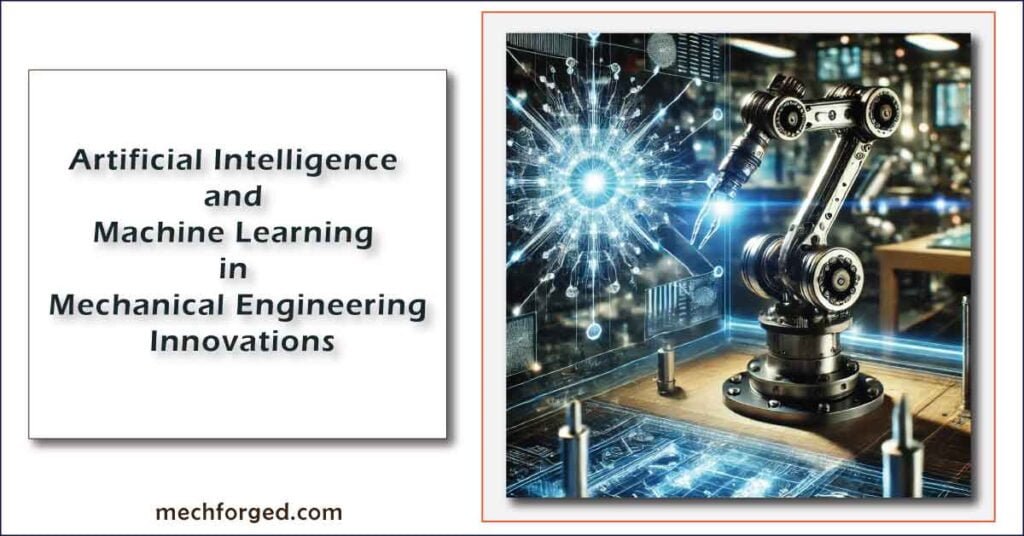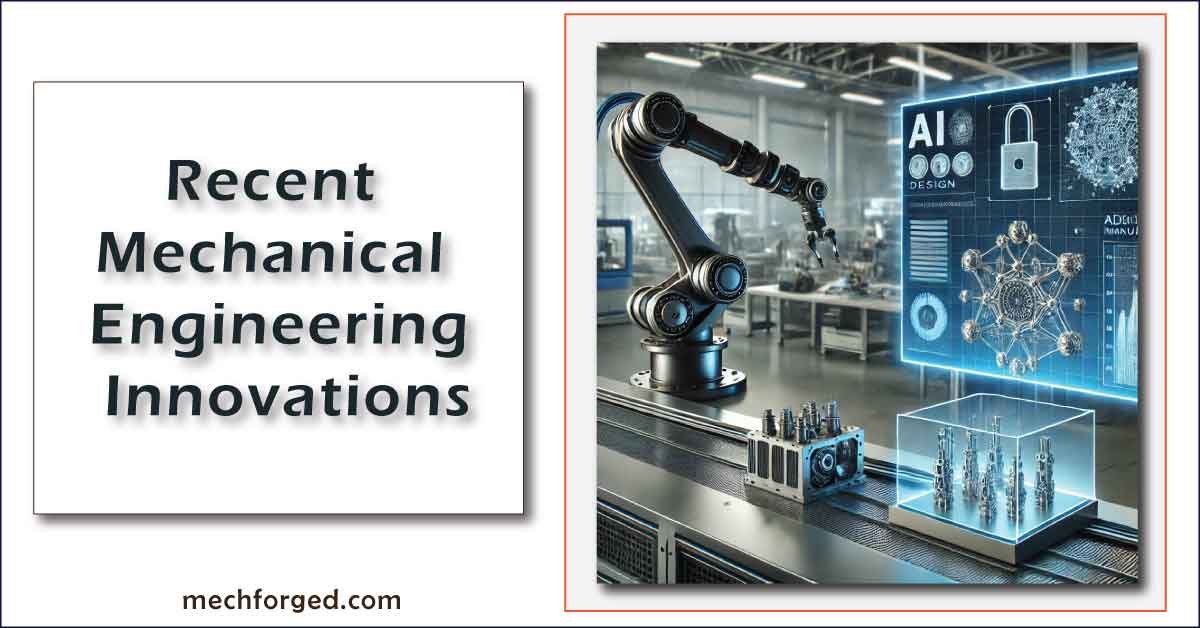Mechanical engineering has also played a central role in the development of technology this we can see by its impact on industries and people’s lives. It is a dynamically advancing field that presents innovative concepts which shape not only the design and manufacturing but the operational processes as well. This post delves into the most recent innovations in mechanical engineering, focusing on five key areas: Sustainable materials, novel manufacturing processes, robotic systems, sustainable energy, its storage and utilization, or integration of artificial intelligence are some of the samples of the cutting-edge technologies.
1. Advanced Materials in Mechanical Engineering Innovations
Advanced materials are artificially developed materials that are made to possess higher qualities that the regular materials, for instance, strength, light weight and durability. Composites, nanomaterials and intelligent materials are some of the common materials in mechanical engineering innovations that helps in developing lighter but stronger and efficient components used in aerospace, automobile, construction industries etc. In particular, they bring significant performance improvements to risky production stages while exerting minimal harm to the environment.
a. Nanomaterials and Nanotechnology
Described as nanoscale, nanomaterials are built to having unique properties that are not characteristic of standard material. Some of these are carbon nanotubes and graphene that possess such attributes as high strength to weight, thermal and electrical conductivity. The inclusion of these nanomaterials into the composites enables mechanical engineers to develop components which are lighter, stronger and more durable for certain applications such as aerospace and automotive industries.
B. Smart Materials
Smart materials are one of the unique inventions in mechanical engineering, which are capable of responding to some of the environmental factors such as temperature, pressure and magnetism. Two principal examples can be cited here to explain the material properties: shape-memory alloys (SMAs) and piezoelectric materials. SMAs can return to their original shape after deformation, making them valuable in medical devices and actuators. Piezoelectric materials, which generate electric charges under mechanical stress, are essential in sensors and energy harvesting, contributing to the development of responsive and energy-efficient systems.
2. Additive Manufacturing in Mechanical Engineering Innovations
Additive manufacturing also referred to as 3D printing is a process of making objects from solid materials through an adding process using computer control aided layers of a material. This new technology is very useful in mechanical engineering because it allows complexity and accuracy in the designs, saves on material costs through minimal material usage and shortens the cycle of prototyping. 3D printing or additive manufacturing is most beneficial to industries, including aerospace, automotive, and medical, respectively.
a. Metal 3D Printing
Metal 3D printing can be described as the next step up in the innovations in the mechanical engineering. It makes it possible to produce complicated and strong parts which could be difficult to manufacture by other conventional techniques. The aerospace industry and the automotive industry are the two major industries that pull huge benefits from this technology, especially in the production of such small and complex parts as the turbine blades and the fuel nozzles. These components enhance fuel economy and emissions, demonstrating the opportunity of the technology for reviving manufacturing.
b. Multi-Material and Hybrid Manufacturing
MULTI-MATERIALS Additive manufacturing or 3D printing and hybrid manufacturing are novel inventions in the field of additive manufacturing. Such techniques allow for creating parts with dissimilar properties, with different materials in a single part. A combination of additive and subtraction processes makes hybrid manufacturing accurate especially in the surface finish hence suitable for critical application. Such advancements are bringing changes in the versatility that was never before possible in relation to manufacturing of mechanical parts.
3. Robotics and Automation in Mechanical Engineering Innovations
Robotics and automation refers to the use of robotics as well as automated systems to carry out activities which could otherwise be repetitive, requiring high precision or are hazardous. In mechanical engineering there has been advancement of cobot or collaborative robots, autonomous system and smart manufacturing systems. These developments make manufacturing and logistics more effective, safe and efficient, and improve general well-being in such sectors as, manufacturing, medical and farming among others.
a. Collaborative Robots (Cobots)
Cobots are a huge leap in mechanical engineering new development. Intended for collaborative operations with people, cobots’ role is to optimize efficiency, as well as minimize risks in various production sectors. Unlike traditional industrial robots, which operate in isolation, cobots are equipped with advanced sensors and AI algorithms that allow them to adapt to their surroundings and collaborate with human workers. They are increasingly used in tasks like assembly, material handling, and quality inspection, where their precision and flexibility are invaluable.
b. Autonomous Systems
Autonomous systems, including self-driving vehicles and drones, are transforming industries by reducing human intervention and increasing efficiency. These systems rely on mechanical engineering innovations in sensor technology, control systems, and AI to operate independently in complex environments. Autonomous vehicles are being developed for logistics, agriculture, and public transportation, while drones are used for applications ranging from aerial surveying to delivery services. These advancements are driving significant progress in automation and robotics.
4. Energy Efficiency and Sustainability in Mechanical Engineering Innovations
Energy efficiency and sustainability entails avoiding wastage of energy while checking on the effects that this energy has on the environment. Concerning mechanical engineering, shocks in this area are centered on increased exploits on renewable energy sources, efficiency improvement of energy storage systems and advocacy for green building. Such actions are being spearheaded to ensure the reduction of green house gas emissions, optimal use of resources and achieving sustainable development.
a. Renewable Energy Technologies
Mechanical engineering inventions are important in enhancing the renewable form of energy, which is very important as it assists in doing away with the conventional energy sources. Technological advancements in wind turbines therefore see introduction of big and efficient turbines in the generation of power from winds with minimal effects on the environment. Hence increased on blade materials, aerodynamics, and control system means wind energy is going to be a more viable option in the large-scale ability to generate energy and hence contributing to the sustainability goals of the world.
b. Energy Storage Solutions
Energy storage is a critical aspect of mechanical engineering innovations, particularly as renewable energy sources like solar and wind are intermittent. Advanced energy storage solutions, such as high-capacity batteries, flywheels, and pumped hydro storage systems, are being developed to store excess energy and release it when needed. These technologies are essential for stabilizing the grid and ensuring a reliable energy supply, supporting the global transition to sustainable energy systems.
c. Green Building Technologies
Mechanical engineers’ advancements in green building technologies are enabling construction industries in developing environmentally friendly structures with better energy use. New trends in construction, specified in heating, ventilation, and air conditioning systems, insulating materials, and smart windows are the perfect examples of these efforts done to minimize energy consumption and enhance the comfort of the building’s interior. Also, incorporating renewable energy systems like solar power units, wind turbines and geothermal heat pumps into building designs are resulting into zero energy buildings which utilize as much energy as they generate.

5. Artificial Intelligence and Machine Learning in Mechanical Engineering Innovations
Artificial intelligence (AI) and Machine Learning are ways of accomplishing task and decision making by putting into consideration algorithms and data analysis mimic human intelligence. In mechanical engineering these technologies are being used in the design, manufacturing and maintenance of systems for enhanced performance, failure prognoses and for automation. These and other breakthroughs associated with AI and machine learning enable engineering that produces systems smarter, efficient facilitating adaptability in systems.
a. AI-Driven Design
AI-driven design tools are revolutionizing mechanical engineering innovations by enabling the creation of optimized structures and components. These tools use AI algorithms to analyze vast amounts of data and generate design alternatives that meet specific performance criteria. Generative design software, for example, can create optimized structures with minimal weight and maximum strength, which are then produced using additive manufacturing techniques. This approach is transforming how engineers approach design, leading to more efficient and innovative solutions.
b. Predictive Maintenance
Predictive maintenance is one of the ways through which Artificial Intelligence and Machine learning are being embraced in the Mechanical Engineering innovations. Using machine learning it is possible to process data received from sensors and other sources to predict when equipment is likely to fail, allowing maintenance to be performed proactively. This reduces downtime and repair costs, particularly in industries where equipment failures can have significant financial and operational consequences. By leveraging AI, mechanical engineers can improve the reliability and efficiency of complex systems.
c. Autonomous Manufacturing
One of the greatest advancements within mechanical engineering is the autonomous manufacturing which is fully controlled by Artificial Intelligence. In smart factories the robots and the machines are autonomous with the capability of making decisions on their own which are based on sensorial input. These systems can work at a variable pace more so enabling adjustments of the production processes in terms of efficiency and quality as well as minimization of wastage. The incorporation of AI in manufacturing is paving way to creation of next generation of smart manufacturing systems that has ability to respond dynamically to changes in demand conditions or supply chain shocks.
Conclusion: The Future of Mechanical Engineering Innovations
Mechanical engineering innovations are driving progress across all sectors, pushing the boundaries of what’s possible in design, manufacturing, and system operation. As technology continues to advance, engineers are at the forefront of solving global challenges, from sustainability and energy efficiency to automation and intelligent systems. These innovations are not only transforming mechanical engineering but are also creating a more sustainable, efficient, and intelligent future for industries and society as a whole.
Artificial Intelligence and Industrial Automation are revolutionizing modern industries by integrating smart technologies with mechanical systems. Artificial Intelligence enables machines to learn and adapt, while Industrial Automation streamlines operations, increasing efficiency and precision. Together, these innovations are driving significant advancements in engineering and manufacturing. To understand how these technologies are shaping the future, delve into the full post for a comprehensive exploration.

